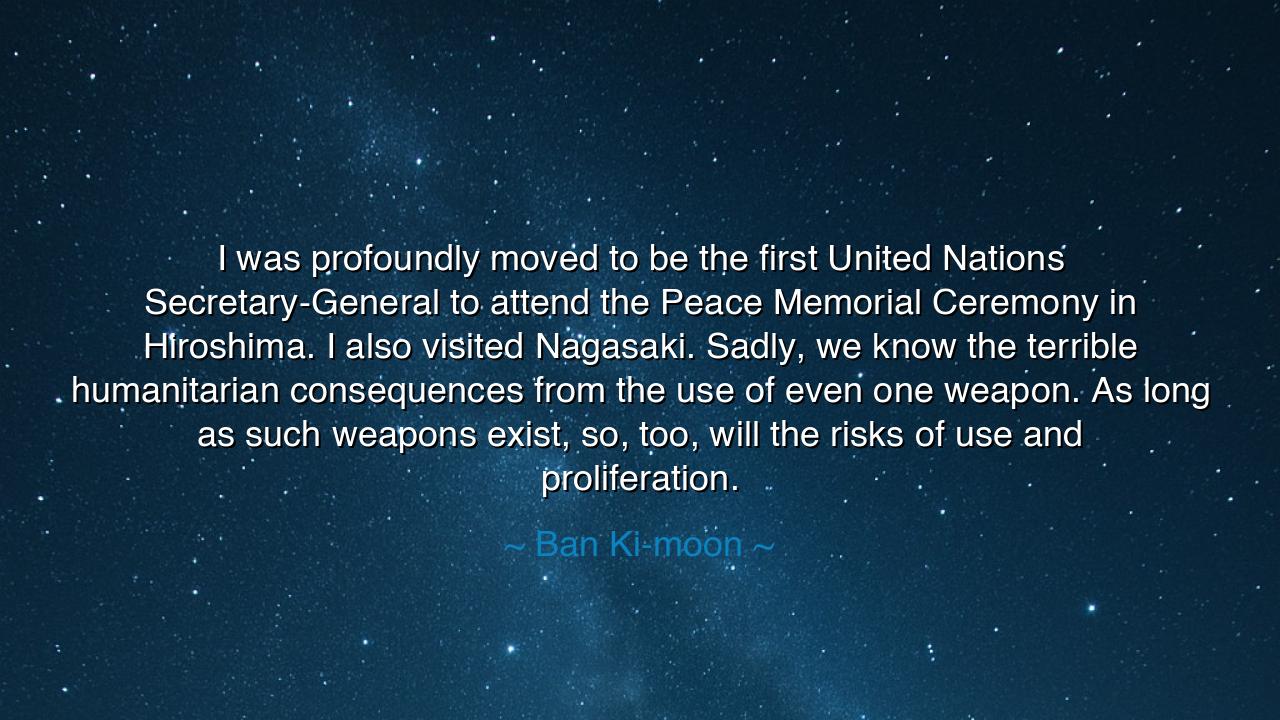
I was profoundly moved to be the first United Nations
I was profoundly moved to be the first United Nations Secretary-General to attend the Peace Memorial Ceremony in Hiroshima. I also visited Nagasaki. Sadly, we know the terrible humanitarian consequences from the use of even one weapon. As long as such weapons exist, so, too, will the risks of use and proliferation.






Hear the solemn words of Ban Ki-moon, who bore the mantle of the world’s conscience as Secretary-General of the United Nations: “I was profoundly moved to be the first United Nations Secretary-General to attend the Peace Memorial Ceremony in Hiroshima. I also visited Nagasaki. Sadly, we know the terrible humanitarian consequences from the use of even one weapon. As long as such weapons exist, so, too, will the risks of use and proliferation.” In this utterance there resounds both lament and warning, both memory and prophecy. It is the cry of one who has stood where fire once devoured cities, where in a single instant lives were extinguished and history itself was scarred.
The meaning is sharp and clear: weapons of mass destruction are not mere instruments of defense, but seeds of annihilation. Even a single weapon, once unleashed, unleashes consequences that stretch beyond soldiers, beyond battlefields, beyond generations. In Hiroshima and Nagasaki, the earth itself bore witness to the destructive power of human hands—children lost, cities turned to ash, survivors marked by invisible scars of radiation. Ban Ki-moon, standing in those places, reminds us that peace must not be built on threats of annihilation, for as long as these weapons exist, so too does the shadow of their use.
The origin of his words lies in the history of August 1945. Hiroshima and Nagasaki, once living cities of work and laughter, were struck by atomic fire. In moments, over a hundred thousand perished. In the years that followed, countless others suffered from sickness and sorrow. Yet from those ashes rose a call to the world: never again. When Ban Ki-moon visited these memorials as Secretary-General, he became the first of his office to do so, honoring not only the dead but the survivors, the hibakusha, whose testimonies keep alive the warning of history.
History itself echoes his truth. Consider the Cold War, when humanity lived under the shadow of thousands of nuclear warheads, any one of which could have destroyed cities, nations, perhaps civilization itself. Time and again, near-accidents and miscalculations brought the world to the edge of ruin. And yet, restraint, diplomacy, and the voice of reason prevented the fire from consuming all. The lesson is plain: as long as such weapons remain, humanity stands on a precipice, trembling at the edge of destruction.
Yet Ban Ki-moon does not only warn; he also calls. His words summon us to humility, to wisdom, and to action. For the risk of proliferation—the spread of such weapons to more nations, to unstable powers, even to groups without mercy—is ever present. If mankind does not act to reduce and eliminate these instruments of terror, then one day chance, malice, or folly will unleash them again. The tragedy of Hiroshima and Nagasaki must not become the prophecy of tomorrow.
The lesson for us, therefore, is not only for governments and generals, but for all people. Peace is not guarded by weapons alone, but by justice, by dialogue, by the willingness to resolve conflict before it festers into war. In our own lives, we too carry “weapons” of anger, pride, and vengeance, which if unleashed can destroy families and communities. The wisdom of Ban Ki-moon extends into our daily struggles: disarm the heart before it strikes, for once the fire is lit, it cannot be called back.
Therefore, let these words endure like a memorial flame: as long as humanity clings to the sword of nuclear power, it also clings to the possibility of its own destruction. Let each generation work to diminish that sword, until it is broken and gone. Let each soul practice peace, so that nations may mirror the hearts of their people. For only then will the cry of Hiroshima and Nagasaki be fulfilled—not in endless mourning, but in the birth of an age where the weak are secure, the strong are just, and the shadow of the mushroom cloud is banished forever.






AAdministratorAdministrator
Welcome, honored guests. Please leave a comment, we will respond soon